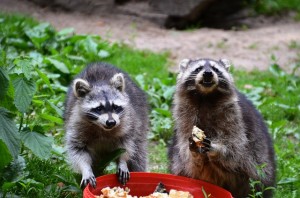
Raccoons may be cute but they are not pets.
Raccoons As Pets
Though raccoons are occasionally raised as pets, they are wild animals and should not be domesticated. Raccoons are not pets in the sense of cats and dogs, and do not have companion instincts. This means they will not obey the commands of their keeper unless it suits their needs. They can easily become fiercely distempered without hesitation. Raccoons are wild animals and belong in the wild, in almost every situation.
Legality
Owning a pet raccoon may not be legal in your state or city. They are considered wild animals and if found with a pet raccoon illegally, owners can be fined, arrested, and charged with Illegal Possession of Wildlife. In addition, to own a raccoon legally, they must be obtained from a licensed breeder and the owner must purchase a license. This license must be renewed every year to keep the pet legally.
Raccoons are known for their destructive, mischievous behavior and they bite frequently. Due to these behaviors, raccoon owners often purchase liability insurance, which can be very difficult or nearly impossible to have approved by insuring companies. The legal expenses and insurance are significant in pet ownership of a raccoon. Considering that most of this is unnecessary with a pet dog or cat it is clear that raccoons are not meant as pets.
Health
The health of raccoons is one reason that they are difficult to own as pets. Raccoons can be difficult to own because many vets do not have the ability to properly care for them. Unless they are wild animal specialists, vets will often turn away pet raccoons. Consider that a pet raccoon may sustain injuries or catch different parasitic diseases and the options for treatment may be fewer, or nonexistent unless a wildlife veterinarian is available in your area.
Raccoons are not immune to rabies. It is unknown if the rabies vaccine (used on dogs) is effective on them. If a pet raccoon bites someone and they file a complaint, it is nearly guaranteed that the pet raccoon will be euthanized. The only way to test for rabies is after the animal is dead, contributing to the likelihood that the pet would be euthanized if rabies were a question. Additionally, raccoons are prone to heart problems and become obese easily. These issues combined make it very difficult to own a raccoon as a pet and keep them healthy.
Commitment
Raccoons are a significant financial and time commitment as a pet. The average indoor raccoon lives around 16 years. Once raised by hand, some raccoons cannot be released into the wild. Raccoon keepers will find themselves unlikely to leave town or vary their schedule often, as it’s rare to find a raccoon pet sitter. In addition, raccoons must have a suitable substitute home if their keeper passes before they do.
Aside from the life commitment of a pet raccoon, they are also a financial commitment and burden on a home environment. They will likely need their own room with bedding and toys. These must be frequently replaced, as they like to destroy indoor furniture, clothes, plants, etc. No place in the home will be off limits unless locks are put in place. It’s suggested that locks should be placed on the medicine cabinet, kitchen cabinets, oven, fridge, freezer, dressers and rooms to allow a raccoon to live safely in a home. Raccoon-proofing a home is an extensive step in ensuring raccoon safety and well being in a home.
Temperament
Raccoons are destructive to a home environment as they are meant to live outdoors. They can cause massive destruction and damage to your home and possessions, as they cannot truly be domesticated. Raccoons will defecate anywhere they please and are not easy to litter box train. Raccoons use their scent to mark their territory and if in a home. They will assume the house is theirs and leave feces not only on the floor, but on top of cabinets and tall objects that only they can reach easily.
Though they may appear to be cuddly, smart creatures, raccoons are very mischievous, vengeful, and have no remorse. If a raccoon is frustrated or mad, they will seek revenge by destroying objects in the home. This can be inspired by something as simple as the owner coming home late from work. Raccoons require constant attention to stay entertained within a house environment and will not behave if left alone. Additionally, they do not cage well, which seems obvious, as a wild animal does not belong in a cage in a home.
Raccoons are very curious and will open every cabinet and even rip through upholstery to examine the object. This behavior is impossible to break, as it is part of their nature. In addition, they will rip window screens, tear buttons off clothes, empty bookcases, and dig up plants, as documented by raccoon pet owners. Some raccoons learn to unlock doors and even turn on sinks and flood homes.
Raccoons do not tend to be comfortable with strangers or sharing and may rifle through pockets and steal whatever objects they please. They will become angered and scared when someone attempts to take their objects back. Raccoons in stressed, scared situations often bite; their teeth are sharp enough to draw blood.
It cannot be emphasized enough, raccoons are wild in natural tendencies because they are wild animals and not meant for indoor, pet life. This poor behavior grows worse as they age and go through mating season.
Raccoons Are Not Pets
The difficulties with legality, temperament, and commitment of a raccoon are excellent reasons to pursue a different route of pet ownership. Dogs, cats, and numerous other pets are legal, domesticated, trainable, and are meant for human companionship. Raccoons are a stark contrast because they are truly wild animals and will never lose their instincts, regardless of breeders breeding generations of “domestic” raccoons. Although they may not significantly harm a human, it nearly guaranteed that they will be destructive and cause damage a home and bite someone, at some time.
If wild raccoons take residence in your home or you find babies without a mother, you should immediately call pest control to safely remove and relocate them. Raccoons are not meant for pet ownership, regardless of their cute, fuzzy appearance.
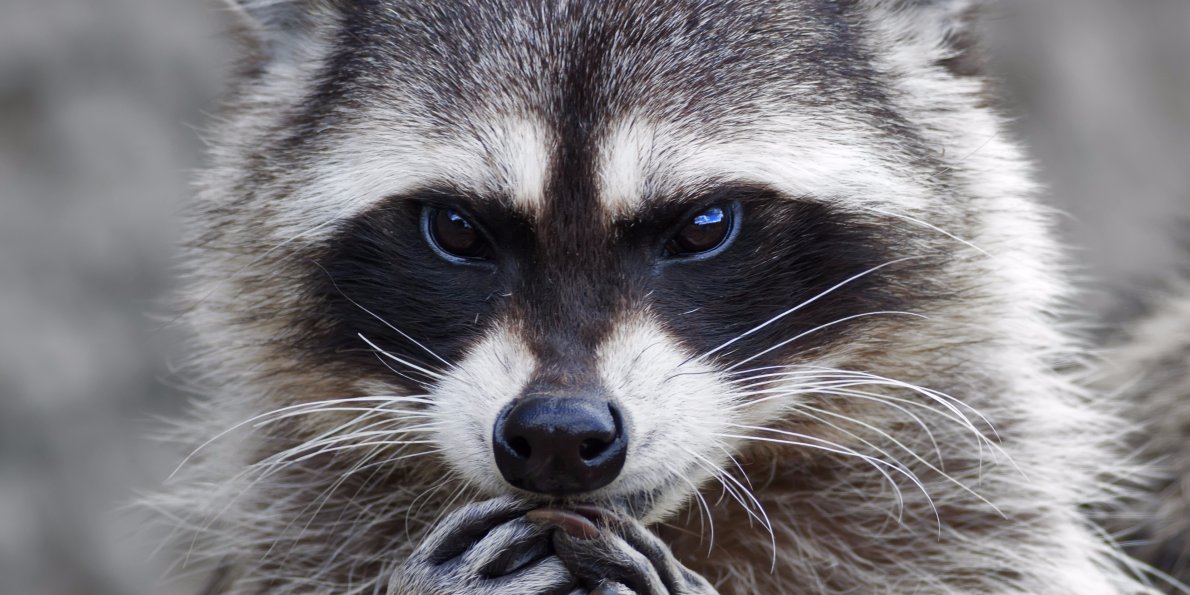 Charging rent is not the answer.
Charging rent is not the answer.




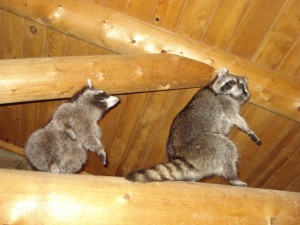
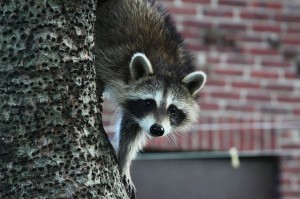
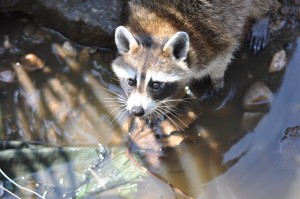 Perhaps one of the most unusual habits raccoons have is dunking their food in water before eating it. The raccoon’s scientific name is procyon lotor, which actually means “washing bear.” This makes sense considering their odd food-washing habit and bear-like markings. Raccoons are nocturnal animals, meaning they are active at night. Most raccoons spend the day in their dens and as soon as dusk approaches, they head out in search of food. Some places raccoons like to search include farms (crops are a big hit with them), ponds, lakes, and of course your garbage can. As sunrise approaches, raccoons typically call it a night and head back to their den to sleep.
Perhaps one of the most unusual habits raccoons have is dunking their food in water before eating it. The raccoon’s scientific name is procyon lotor, which actually means “washing bear.” This makes sense considering their odd food-washing habit and bear-like markings. Raccoons are nocturnal animals, meaning they are active at night. Most raccoons spend the day in their dens and as soon as dusk approaches, they head out in search of food. Some places raccoons like to search include farms (crops are a big hit with them), ponds, lakes, and of course your garbage can. As sunrise approaches, raccoons typically call it a night and head back to their den to sleep.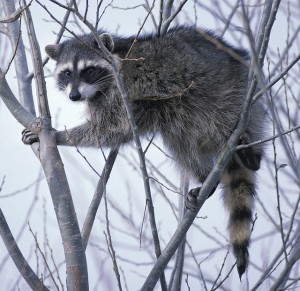 Raccoons do not hibernate in winter. This myth may have started because during very cold days raccoons take refuge in their warm dens. Depending on the climate and weather, raccoons may spend weeks in their dens, living off of their fat stores, until the climate becomes somewhat more mild. When raccoons are sleeping off the cold temperatures, those fat stores keep them alive since they do not eat. This is why raccoons seem to be particularly troublesome in the spring; they’re starving and they want YOUR garbage!
Raccoons do not hibernate in winter. This myth may have started because during very cold days raccoons take refuge in their warm dens. Depending on the climate and weather, raccoons may spend weeks in their dens, living off of their fat stores, until the climate becomes somewhat more mild. When raccoons are sleeping off the cold temperatures, those fat stores keep them alive since they do not eat. This is why raccoons seem to be particularly troublesome in the spring; they’re starving and they want YOUR garbage!